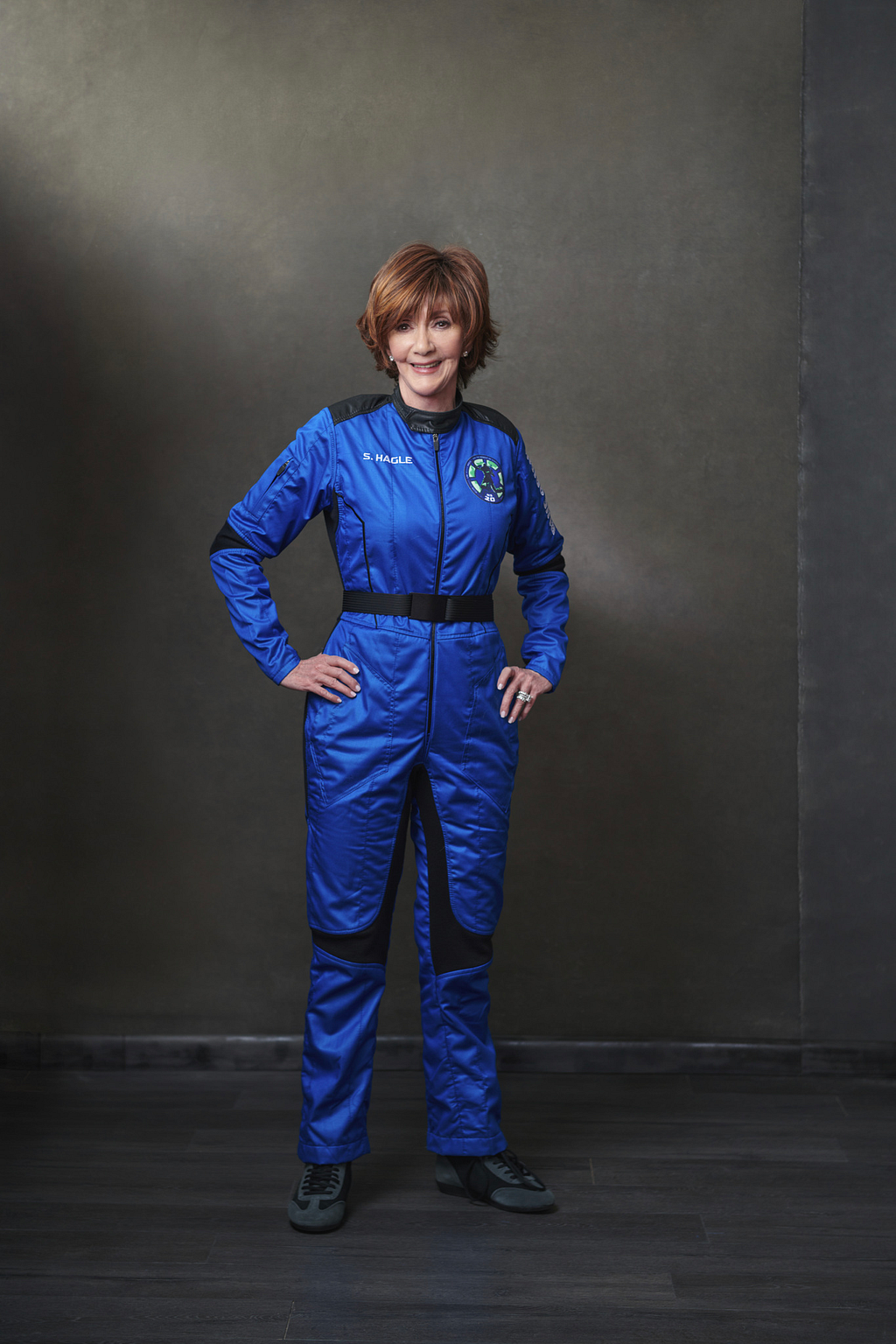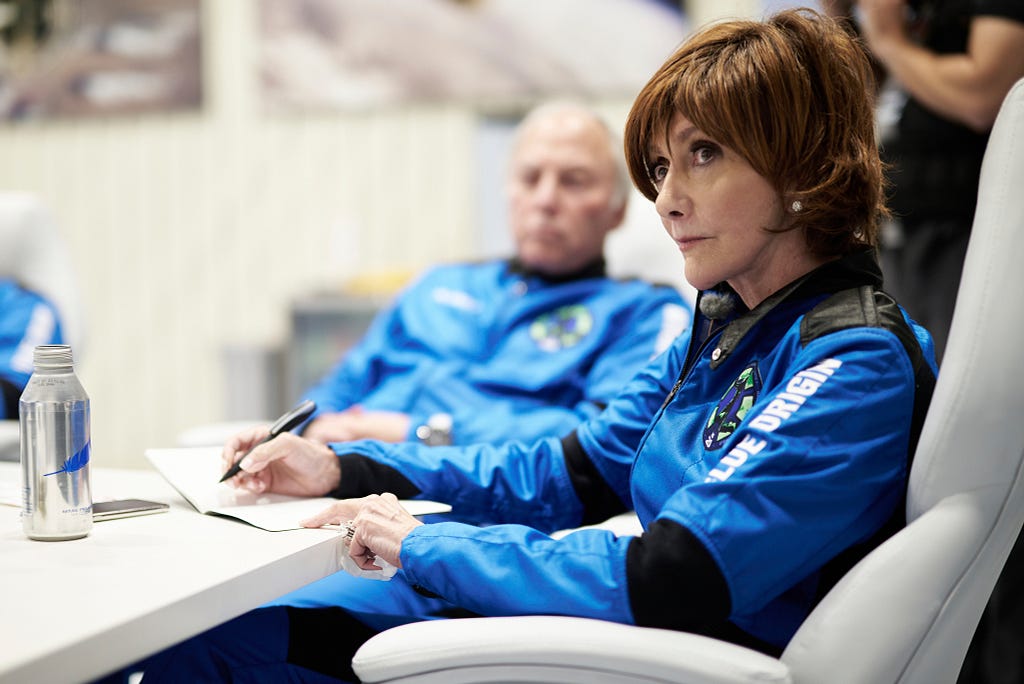Inspirational Women in STEM and Tech: Astronaut Sharon Hagle On The Leadership Lessons She Learned From Her Experience
An Interview With Candice Georgiadice

Get outside your comfort zone: I never dreamed as a 12-year-old girl in elementary school in 1961, listening to the radio broadcast of Alan Shepard being the first American in space, that one day I would have an opportunity to launch on the New Shepard rocket named after him. Traveling to space was completely outside of my comfort zone, and it has challenged me to use this life lesson to inspire kids that anything is possible.
As a part of our series about “Lessons From Inspirational Women in STEM and Tech”, we had the pleasure of interviewing Sharon Hagle.
Sharon Hagle, entrepreneur and astronaut, founded SpaceKids Global™ in 2015 with the mission to inspire STEAM+ Environment Education, with the goal of bringing the possibility of space to children. Sharon shares her journey to space and inspires students through speaking engagements at schools, nonprofit youth organizations, science centers, universities and space organizations. To date, Sharon has reached over 357,000 students globally.
Thank you so much for doing this with us! Can you tell us a story about what brought you to this specific career path?
When I signed up to be a Virgin Galactic Future Astronaut in 2007, a group of us formed a nonprofit called Galactic Unite, a subsidiary of Virgin Unite. My focus with the foundation was education. In doing research, I discovered data from the International Education Index indicating that U.S. students ranked 38th in math and 41st in science. How could one of the wealthiest industrial nations be ranked so low in two of the most important economic indicators in education? Something had to be done.
Can you share the most interesting story that happened to you since you started SpaceKids Global?
In February of 2022, SpaceKids Global launched a national essay competition with the theme of “Why I Want To Go To Space.” The competition was open to United States students ages 8– 12, enrolled in public, private, parochial or home schools. We received essays from students in 22 states and 46 cities across the country, and half of the submissions were from girls, including one of our winners, Milan, a spectacular 5th grader from LA.
The other essay winner was an 11 year-old named Brian, who is homeschooled by his mother. Each essay was reviewed by a judges panel comprised of some of the biggest names in the space industry including Blue Origin, Virgin Galactic, and SpaceX . Those who read Brian’s essay were convinced that it was written by one of his parents, due to the advanced vocabulary and writing skills of someone his age. As part of the selection process, we had a video interview with Brian. Within the first minute of the conversation, it was obvious that Brian wrote the essay himself. He aspires to be both an astrophysicist and a space lawyer, and is already taking college classes. In his spare time, he volunteers teaching English to first-generation American kids.
It has been said that our mistakes can be our greatest teachers. Can you share a story about the funniest mistake you made when you were first starting? Can you tell us what lesson you learned from that?
When I first started speaking in schools about my journey to space, I wanted to make sure I got the kids’ attention. I brought my dog Saba, a 5-pound Pomeranian, dressed in his own flight suit. As soon as Saba came out of his carrier, the kids went crazy. He certainly got their attention. However, the focus was on Saba for the remainder of my time with the students. I learned to bring him out at the end of presentations from then on.
What do you think makes your organization stand out?
One of the main differentiators of SpaceKids Global from other national STEM/STEAM education nonprofits is that our focus is on elementary students, ensuring girls are equally represented. Studies show that if you don’t get kids hooked on math and science by 6 or 7, it’s unlikely they will develop an interest in space exploration. This is why we focus on this age group where we can make the biggest impact early on.
Are you working on any exciting new projects now? How do you think that will help people?
It was announced in September that I am returning to space on a future Blue Origin New Shepard flight. Eight lucky kids (and one chaperone each), ages 8–12, can win an opportunity to fly to Texas and view the flight from Astronaut Village.
Participants will submit an entry form. Eight winners will be selected as follows;
- Five of the winners will be selected from five separate geographic regions across the United States.
- One of the winners will be the child of a first responder, one will be the child of an active-duty member of the U.S. military, and one will be from Canada as part of SpaceKids Global’s partnership with the Boys & Girls Clubs of Canada.
Ok super. Thank you for all that. Let’s now shift to the main focus of our interview. Are you currently satisfied with the status quo regarding women in STEM? What specific changes do you think are needed to change the status quo?
To date, out of the 8 billion people on earth, only 612 humans have been to space. When I was launched over the Karman Line in March of this year, I was the 72nd woman to go to space. We encourage space companies to reference humans versus gender, in an effort to make significant progress in engaging more women in human space flight.
In your opinion, what are the biggest challenges faced by women in STEM or Tech that aren’t typically faced by their male counterparts? What would you suggest to address this?
Women make up 13% of all engineers in the United States. Studies also show that women stay in the engineering field less than one year due to isolation. More peer-to-peer engagement and women mentoring younger women is one suggestion to address this. Companies need to be more proactive as early as elementary school in getting girls excited about their futures in engineering, and create a pipeline through middle school, high school and ultimately college to ensure an equal number of women in STEM or Tech.
What are your “Leadership Lessons I Learned From My Experience as a Woman in STEM or Tech” and why. (Please share a story or example for each.)
#1. Get outside your comfort zone:
I never dreamed as a 12-year-old girl in elementary school in 1961, listening to the radio broadcast of Alan Shepard being the first American in space, that one day I would have an opportunity to launch on the New Shepard rocket named after him. Traveling to space was completely outside of my comfort zone, and it has challenged me to use this life lesson to inspire kids that anything is possible.
#2. Age is just a number:
You can start a new career, hobby or dream at any age. As a society we are living longer, healthier lives, and continue to contribute to work and home life in ways never thought possible just a few decades ago. I encourage all women of any age to pursue their passions.
#3. Learn something new every day:
As cliché as that saying is, it’s very true. Learning = growing. Technology is changing so fast, it seems impossible to keep up. There are so many resources to keep us at the top of our games in media, technology and science. Keep an open mind to learning a new skill or even new career path. Challenge yourself and your mind.
#4. Don’t fall prey to the naysayers:
You’ve earned a seat at the table based upon your experience and contributions. Use your voice. Be proud of your accomplishments. You belong here.
What advice would you give to other women leaders to help their team to thrive?
Surround yourself with people who are smarter than you and who have different life, career and education experiences than you do. Then give them the support and resources they need, and let them do their jobs.
None of us are able to achieve success without some help along the way. Is there a particular person who you are grateful towards who helped get you to where you are? Can you share a story about that?
Throughout the course of my career, I have had the opportunity to be introduced to a wide variety of influencers in the space industry. There have been a village of supporters who have inspired me along the way. My biggest champion has been my husband, Marc, who continues to provide guidance and encouragement in my efforts to expand SpaceKids Global programs across the globe.
How have you used your success to bring goodness to the world?
I have spoken to over 357,000 kids across the globe since launching SpaceKids Global in 2015. During my speaking engagements, I challenge kids to think about what their personal mission is, and how they can make the world a better place. Early on, my focus was what does it take to go to space, and today I get to share what it’s like to go to space. It’s my life’s work to bring the possibility of space to kids everywhere.

You are a person of enormous influence. If you could inspire a movement that would bring the most amount of good to the most amount of people, what would that be? You never know what your idea can trigger. 🙂
STEAM education has to become the number one focus and priority of all public and private schools in our country. It’s important to include the A in STEAM, because art is a huge part of creativity, especially in technology. Design and science are inextricably linked.
Parents, educators and employers have an unprecedented opportunity to join forces to ensure our kids are number one in math and science, and are all focusing on and considering careers in STEAM to fill the pipeline of 3.5 million STEAM job vacancies that need to be filled by 2025.
Can you please give us your favorite “Life Lesson Quote”? Can you share how that was relevant to you in your life?
“If your dreams don’t scare you, they’re too small.” — Richard Branson
Richard Branson has been a friend and colleague of mine for years. He inspires me in many ways, but this quote really resonated with me. He pushed me out of my comfort zone, and literally into space. I will be forever grateful for our friendship.
We are very blessed that very prominent leaders read this column. Is there a person in the world, or in the US with whom you would love to have a private breakfast or lunch with, and why? He or she might just see this if we tag them 🙂
Dr. Michio Kaku — I had the opportunity to hear him lecture at Rollins College, and was captivated by his passion and perspective on physics and science. In his speech, he stated that studies show that if you don’t get kids hooked on math and science by age 6 or 7, you’ve lost them. He was part of my inspiration to focus SpaceKids Global on elementary age students.
Thank you for these fantastic insights. We greatly appreciate the time you spent on this.
Inspirational Women in STEM and Tech: Astronaut Sharon Hagle On The Leadership Lessons She Learned… was originally published in Authority Magazine on Medium, where people are continuing the conversation by highlighting and responding to this story.

